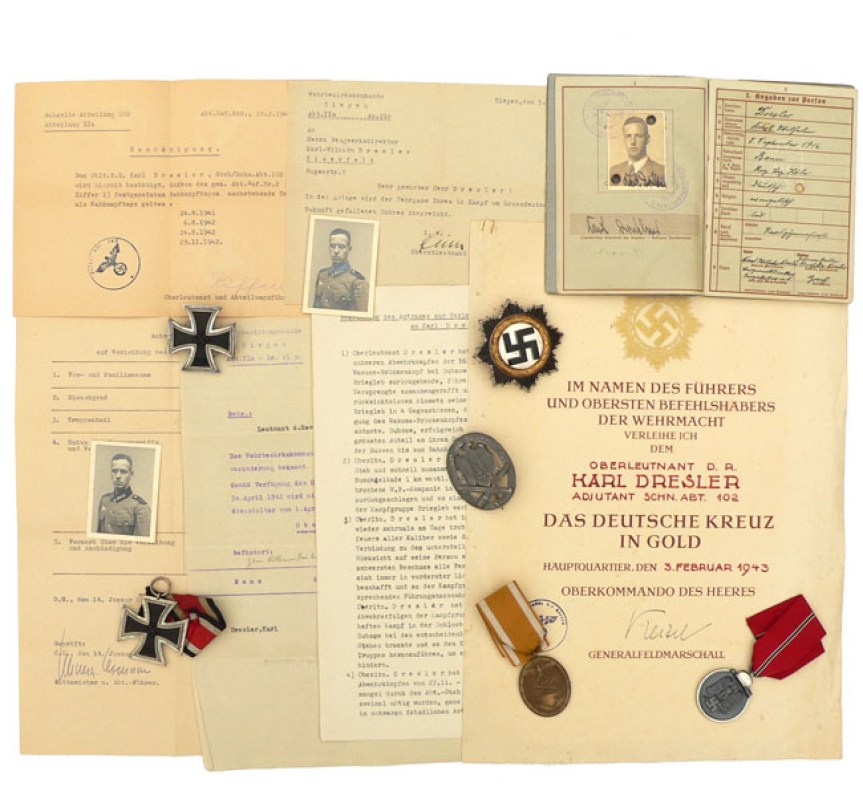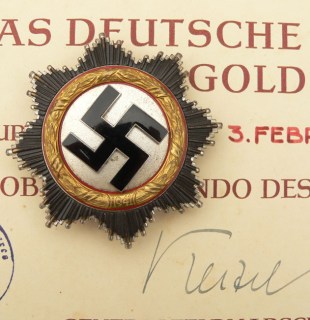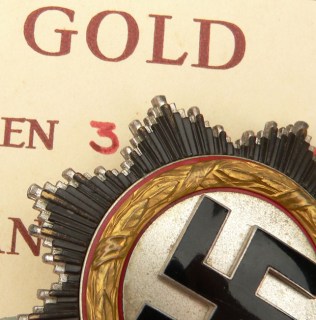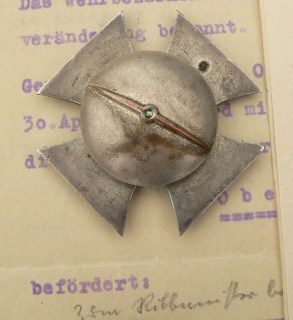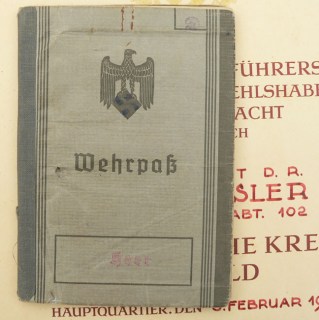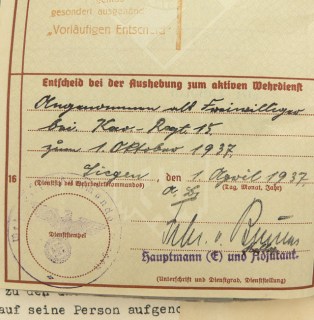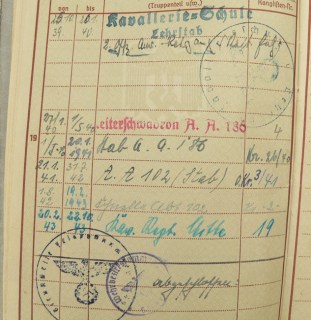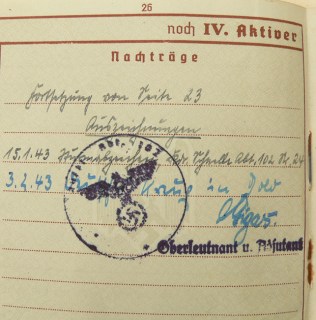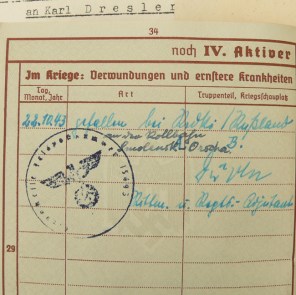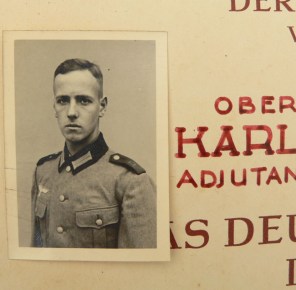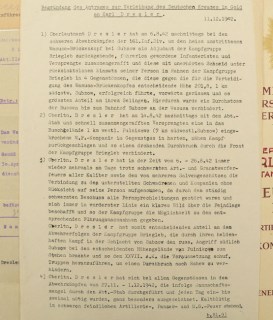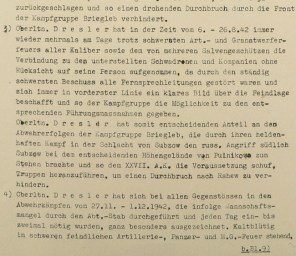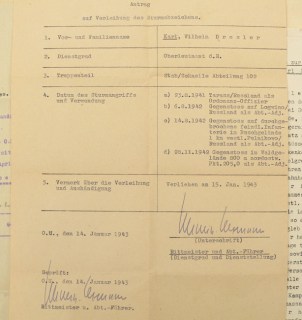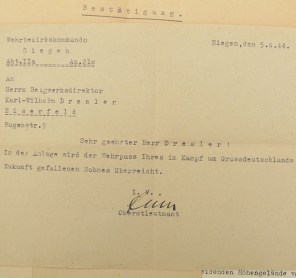German Cross in Gold Grouping
'Deutsches Kreuz in Gold' (German Cross in Gold) Grouping to Oberleutnant d.R. 'Karl Dresler' who was the 'Adjutant' from the 'Schnellen Abteilung 102' (Panzerjäger-Abteilung). The grouping is including his Wehrpaß, two small sized portrait-photos, his German Cross in Gold, the large-sized German Cross in Gold Award-Document and various other medals and documents, see photos.
When individuals received their registration notice they were to report to the appropriate recruitment center where they would be issued a 'Wehrpaß', until they were inducted into active duty. From the autumn of 1939, when an individual was inducted into active military service the Wehrpaß was exchanged at the recruitment office for the 'Soldbuch' (Pay Book), which remained in the recipients possession as his official military identification document. The recruitment office would retain the Wehrpass and chronicle the individuals active service record in it. This Wehrpaß belonged to 'Karl Dresler', he came into active military service on 1 October 1937 in the '1.Schwadron kavallerie-Regiment 15'. He served in several units during the war. He started his career as a 'Gefreiter' and was promoted several times, on 1 April 1942 he was promoted to 'Oberleutnant d.R.' and on 1 September 1943 to 'Rittmeister d.R.'. According to his Wehrpas he was awarded with the following awards:
- 25 January 1941 - Deutsches Schutzwall-Ehrenzeichen (Westwall Medal)
- 20 April 1941 - War Merit Cross 2nd Class with Swords
- 3 September 1941 - Iron Cross 2nd Class
- 12 July 1942 - Iron Cross 1st Class
- 27 August 1942 - Ostmedal
- 15 January 1943 - Sturmabzeichen (General Assault Badge)
- 3 February 1943 - German Cross in Gold
He took part in the Poland Campaign in September 1939. In May 1940 he took part in the invasion of Belgium: 'Vormarsch und einsatz zur Abwehr an der Südfront (Süd-Belgien)'. On 22 June 1941 he took part in the invasion of Russia with battles near Bialystok, Minsk, 'Schlacht bei Wel-Luki', 'Doppelschlacht bei Wjasma und Bryansk', the 'Vorstoß gegen Moskau', the battles around Moscow in the period from 5 December 1941 to 18 April 1942 as part of the 'Infanterie-Division 102'. Battles north of 'Rshew', see photos for more details.
'Karl Dresler' was awarded with the German Cross in Gold on 3 February 1943. The German Cross was introduced by Adolf Hitler on 28 September 1941 in two classes, Gold and Silver. The gold class cross was awarded to military personnel for exceptional acts of bravery or achievement in combat, the Silver class was awarded for distinguished acts of service in the war effort. The German Cross was to be worn on the lower right breast of the service tunic or field blouse. The cross in this grouping is the light weight version, maker marked with number '20' on the pin, indicating production by the company 'C.F.Zimmermann' in Pforzheim. All enamel of the cross is intact and just perfect, it is void of any scratches/damages. There is only a bit of age patina on the silver finish behind the swatika. The cross is in overall very good, near mint, condition. The large sized German Cross in Gold award-document (Urkunde) was awarded to 'Karl Dresler' on 3 February 1943. The document is personally signed by Generalfeldmarschall 'Wilhelm Keitel'. The document is also clearly ink-stamped with a stamp from the 'Oberkommando des Heeres', the swastika has been blackened. The document is in good, unfolded, condition showing normal traces of usage. Also included is his rare letter of recommendation for the German Cross in Gold, in this letter you can read an incredible history on his actions (on foot and with a sturmgeschütz) at the front for which he was awarded the German Cross in Gold.
'Karl Dresler' was killed in action on 22 October 1943 near Redki, located near the 'Rollbahn Smolensk-Orscha'.
Please take a look at the photos for more details. This grouping originates from my own private collection. Desirable and unique grouping!
